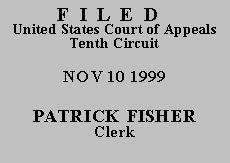Before TACHA, McKAY, and
MURPHY, Circuit Judges.

After examining the briefs and appellate record, this panel has determined unanimously that oral argument would not materially assist the determination of this appeal. See Fed. R. App. P. 34(a)(2); 10th Cir. R. 34.1(G). The case is therefore ordered submitted without oral argument.
Dale Ernest Denoyer appeals from the district court's dismissal of his 28 U.S.C. § 2241 habeas petition. This court exercises jurisdiction pursuant to 28 U.S.C. § 1291 and affirms.
Denoyer pleaded guilty in 1985 to one count of burglary in violation of the Indian Major Crimes Act, 18 U.S.C. § 1153, and South Dakota Criminal Law § 22-32-1, and one count of escape from custody in violation of 18 U.S.C. § 751(a). He was sentenced to five years on the escape count and twenty-five years on the burglary count. Denoyer applied for parole in 1995. The Parole Commission ("PC") applied the parole guidelines and concluded that Denoyer should serve 194 months before he was eligible for parole. Accordingly, the PC set a presumptive parole date of April 14, 2000. After exhausting his administrative remedies, Denoyer brought the instant § 2241 petition. In his petition, Denoyer alleged that the PC had erred in calculating his parole eligibility date according to the United States Sentencing Guidelines rather than South Dakota law.(1) In two well-reasoned and thorough orders a magistrate judge and the district court rejected Denoyer's claims. Both noted that in contrast to Denoyer's assertions, the PC had not set his parole eligibility date by reference to the United States Sentencing Guidelines, but had instead relied on parole guidelines promulgated by the PC. Furthermore, in response to Denoyer's claim that state law applied the parole eligibility factors for defendants sentenced to prison for violations of the Indian Major Crimes Act, both the magistrate judge and district court cited to case law from this Circuit and others holding that neither federal courts nor the PC are bound by state parole policies for setting punishment of federal law, even when federal law incorporates substantive provisions of state law providing the definitions of the crimes. See United States v. Garcia, 893 F.2d 250, 254 (10th Cir. 1989) (holding that "federal courts need not follow state parole policies" in sentencing a defendant for violations of the Assimilative Crimes Act); United States v. Norquay, 905 F.2d 1157, 1162 (8th Cir. 1990) ("The incorporation [of state law in the Indian Major Crimes Act] does not go beyond that state law which establishes the elements of the offense and the range of punishment. . . . Before the Sentencing Act eliminated the parole system, several circuits held that federal courts sentencing a defendant under the Assimilative Crimes Act should follow federal law concerning parole eligibility rather than state law.").
This court has undertaken a detailed review of the parties' briefs and contentions, the magistrate's report and recommendation, the district court's order, and the entire record on appeal. In light of that review, this court AFFIRMS the district court's dismissal of Denoyer's § 2241 petition for substantially those reasons set forth in the magistrate's report and recommendation dated June 3, 1999, and the district court's order dated July 2, 1999. In light of our affirmance of the district court's dismissal of Denoyer's petition, we DENY as moot Denoyer's Motion of September 12, 1999 seeking a transfer to a different penal facility pending the resolution of the appeal.
ENTERED FOR THE COURT
Michael R. Murphy
Circuit Judge
Click footnote number to return to corresponding location in the text.
*. This order and judgment is not binding precedent, except under the doctrines of law of the case, res judicata and collateral estoppel. The court generally disfavors the citation of orders and judgments; nevertheless, an order and judgment may be cited under the terms and conditions of 10th Cir. R. 36.3.
1.In fact, Denoyer raised three claim in his § 2241 petition. All three claims, however, relate the propriety of the PC calculating Denoyer's parole eligibility date with reference to the parole guidelines instead of South Dakota law.
Comments to: WebMaster, ca10 [at] washburnlaw.edu.
Updated: November 11, 1999.
HTML markup © 1999, Washburn University School of Law.
URL: http://ca10.washburnlaw.edu/cases/1999/11/99-1312.htm.